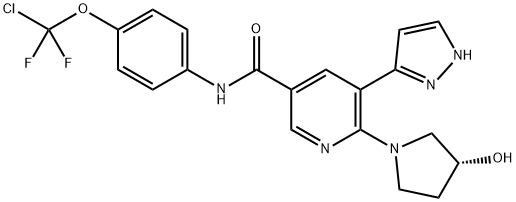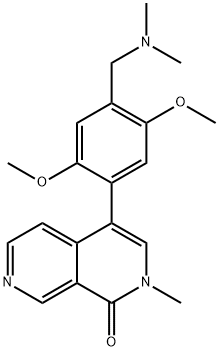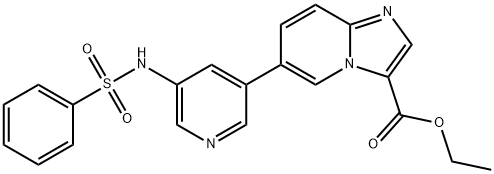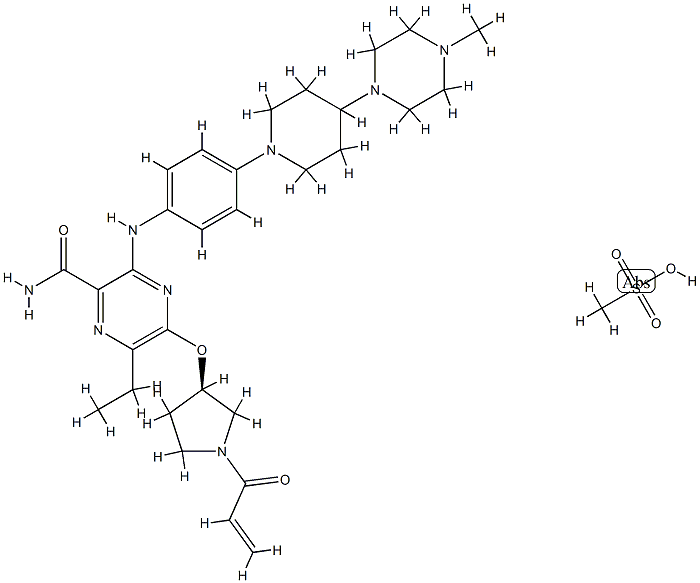BenzaMide, 4-[[2-[3,5-bis(trifluoroMethyl)phenyl]-4,5-bis(4-Methoxyphenyl)-1H-iMidazol-1-yl]Methyl]-
Synonym(s):Apoptosis Activator VII, Apoptozole - CAS 1054543-47-3 - Calbiochem;Hsp70 Inhibitor III, N-(4-Carboxamidobenzyl)-2-(3,5-bis-trifluoromethyl)-4,5-bis-(4-methoxyphenyl)-imidazole;N-(4-Carboxamidobenzyl)-2-(3,5-bis-trifluoromethyl)-4,5-bis-(4-methoxyphenyl)-imidazole, Hsp70 Inhibitor III
- CAS NO.:1054543-47-3
- Empirical Formula: C33H25F6N3O3
- Molecular Weight: 625.56
- MDL number: MFCD19443178
- EINECS: 604-604-1
- SAFETY DATA SHEET (SDS)
- Update Date: 2024-11-19 20:33:22
![BenzaMide, 4-[[2-[3,5-bis(trifluoroMethyl)phenyl]-4,5-bis(4-Methoxyphenyl)-1H-iMidazol-1-yl]Methyl]- Structural](https://img.chemicalbook.in/CAS/GIF/1054543-47-3.gif)
What is BenzaMide, 4-[[2-[3,5-bis(trifluoroMethyl)phenyl]-4,5-bis(4-Methoxyphenyl)-1H-iMidazol-1-yl]Methyl]-?
The Uses of BenzaMide, 4-[[2-[3,5-bis(trifluoroMethyl)phenyl]-4,5-bis(4-Methoxyphenyl)-1H-iMidazol-1-yl]Methyl]-
Apoptozoleis an inhibitor of heat shock protein 70 (Hsp70) and acts by blocking its ATPase activity. Induces apoptosis in cancer cells.
What are the applications of Application
Apoptosis Activator VII, Apoptozole is a cell-permeable imidazole compound that directly binds anti-apoptotic chaperone Hsc70
General Description
A cell-permeable imidazole compound that directly binds anti-apoptotic chaperone Hsc70 and its inducible homologue Hsp70 (Kd = 210 and 140 nM, respectively). Apoptozole is shown to effectively inhibit the proliferation of SK-OV-3, HCT-15, and A549 cancer cell lines (IC50 = 220, 250 and 130 nM, respectively) and induce 90% apoptotic cell death in P19 embryonic carcinoma and A549 lung cancer cultures after 12 h drug treatment (1 μM). Shown to suppress ubiquitination of mutant CFTR and promote membrane trafficking, and restore chloride channel activity.
Biological Activity
apoptozole is an inhibitor of atpase activity of hsp70 [1].the heat shock protein 70 (hsp70) protein family plays diverse roles in biological processes and has multiple functions involved in suppression of apoptotic pathways through multiple anti-apoptotic processes. the two major members, constitutive hsc70 and inducible hsp70, are composed of an n-terminal atpase domain and a c-terminal substrate binding domain [1][2].apoptozole (az) is an inhibitor of atpase activity of hsp70. apoptozole inhibited the atpase activity of hsp70 by binding to its atpase domain. in the presence of 200 μm atp, apoptozole inhibited the atpase activity of hsp70 by 32% and 65% at 100 μm and 200 μm, respectively. apoptozole bound hsp70 but not hsp40, hsp60, and hsp90. in several cancer cell lines, apoptozole induced apoptosis in a dose-dependent way with ic50 values ranged from 5 to 7 μm. in hela cells, apoptozole decreased the amount of apaf-1 associated with hsp70 without affecting the expression level of apaf-1, and produced cleaved procaspase-9, suggesting that apoptozole blocked association of hsp70 with apaf-1 and induced caspase-dependent apoptosis.in the nude mice xenografted with a549, rko (colorectal carcinoma), and hela cells, i.p injection of apoptozole reduced tumor volumes by 61%, 65%, and 68%, respectively [1]. in mice administered with both protein antigen and az, az increased immune responses to administered antigens and produced more antibodies [2].
References
[1]. ko sk, kim j, na dc, et al. a small molecule inhibitor of atpase activity of hsp70 induces apoptosis and has antitumor activities. chem biol. 2015 mar 19;22(3):391-403.
[2]. baek kh, zhang h, lee br, et al. a small molecule inhibitor for atpase activity of hsp70 and hsc70 enhances the immune response to protein antigens. sci rep. 2015 dec 3;5:17642.
Properties of BenzaMide, 4-[[2-[3,5-bis(trifluoroMethyl)phenyl]-4,5-bis(4-Methoxyphenyl)-1H-iMidazol-1-yl]Methyl]-
| Melting point: | 225-228°C |
| Boiling point: | 703.5±70.0 °C(Predicted) |
| Density | 1.33±0.1 g/cm3(Predicted) |
| storage temp. | +2C to +8C |
| solubility | DMSO (Slightly), Ethyl Acetate (Slightly), Methanol (Slightly) |
| form | White solid |
| pka | 15.98±0.50(Predicted) |
| color | White |
Safety information for BenzaMide, 4-[[2-[3,5-bis(trifluoroMethyl)phenyl]-4,5-bis(4-Methoxyphenyl)-1H-iMidazol-1-yl]Methyl]-
| Signal word | Warning |
| Pictogram(s) |
 Exclamation Mark Irritant GHS07 |
| GHS Hazard Statements |
H302:Acute toxicity,oral H315:Skin corrosion/irritation H319:Serious eye damage/eye irritation H335:Specific target organ toxicity, single exposure;Respiratory tract irritation |
| Precautionary Statement Codes |
P261:Avoid breathing dust/fume/gas/mist/vapours/spray. P305+P351+P338:IF IN EYES: Rinse cautiously with water for several minutes. Remove contact lenses, if present and easy to do. Continuerinsing. |
Computed Descriptors for BenzaMide, 4-[[2-[3,5-bis(trifluoroMethyl)phenyl]-4,5-bis(4-Methoxyphenyl)-1H-iMidazol-1-yl]Methyl]-
New Products
Tert-butyl bis(2-chloroethyl)carbamate (S)-3-Aminobutanenitrile hydrochloride N-Boc-D-alaninol N-BOC-D/L-ALANINOL N-octanoyl benzotriazole 3-Morpholino-1-(4-nitrophenyl)-5,6-dihydropyridin- 2(1H)-one Furan-2,5-Dicarboxylic Acid Tropic acid Fmoc-Val-Cit-PAB DIETHYL AMINOMALONATE HYDROCHLORIDE 1,1’-CARBONYLDIIMIDAZOLE R-2-BENZYLOXY PROPIONIC ACID 1,1’-CARBONYLDI (1,2-4 TRIAZOLE) N-METHYL INDAZOLE-3-CARBOXYLIC ACID (2-Hydroxyphenyl)acetonitrile 4-Bromopyrazole 5-BROMO-2CYANO PYRIDINE 5-broMo-2-chloro-N-cyclopentylpyriMidin-4-aMine 2-(Cyanocyclohexyl)acetic acid 4-methoxy-3,5-dinitropyridine 2-aminopropyl benzoate hydrochloride 1-(4-(aminomethyl)benzyl)urea hydrochloride tert-butyl 4- (ureidomethyl)benzylcarbamate diethyl 2-(2-((tertbutoxycarbonyl)amino) ethyl)malonateRelated products of tetrahydrofuran





![1-[2-CHLORO-6-[[(3-IODOPHENYL)METHYL]AMINO]-9H-PURIN-9-YL]-1-DEOXY-N-METHYL-BETA-D-RIBOFURANURONAMIDE](https://img.chemicalbook.in/CAS/GIF/163042-96-4.gif)
![6-amino-1,3-dimethyl-4-(4-(trifluoromethyl)phenyl)-1,4-dihydropyrano[2,3-c]pyrazole-5-carbonitrile](https://img.chemicalbook.in/CAS/20180703/GIF/1637739-82-2.gif)

You may like
-
 2033-24-1 98%View Details
2033-24-1 98%View Details
2033-24-1 -
 1975-50-4 98%View Details
1975-50-4 98%View Details
1975-50-4 -
 2-HYDROXY BENZYL ALCOHOL 98%View Details
2-HYDROXY BENZYL ALCOHOL 98%View Details
90-01-7 -
 2-Chloro-1,3-Bis(Dimethylamino)Trimethinium Hexafluorophosphate 221615-75-4 98%View Details
2-Chloro-1,3-Bis(Dimethylamino)Trimethinium Hexafluorophosphate 221615-75-4 98%View Details
221615-75-4 -
 61397-56-6 CIS BROMO BENZOATE 98%View Details
61397-56-6 CIS BROMO BENZOATE 98%View Details
61397-56-6 -
 14714-50-2 (2-Hydroxyphenyl)acetonitrile 98+View Details
14714-50-2 (2-Hydroxyphenyl)acetonitrile 98+View Details
14714-50-2 -
 118753-70-1 98+View Details
118753-70-1 98+View Details
118753-70-1 -
 733039-20-8 5-broMo-2-chloro-N-cyclopentylpyriMidin-4-aMine 98+View Details
733039-20-8 5-broMo-2-chloro-N-cyclopentylpyriMidin-4-aMine 98+View Details
733039-20-8